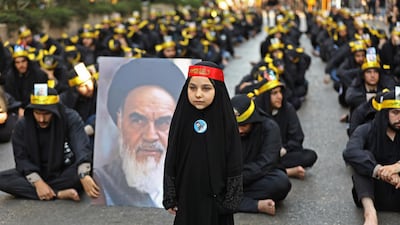Hezbollah shot down an Israeli drone over Beirut to strengthen its deterrence against an all-out attack, the party’s leader Hassan Nasrallah said on Tuesday.
On Monday, Hezbollah said it had shot down and taken an Israeli drone that was flying over South Lebanon.
The militants said it was to retaliate against Israel sending a booby-trapped drone that exploded in their Beirut stronghold on August 25.
“Despite all the threats and intimidation, today we are affirming the balance of power and reinforcing the deterrent force that protects our country,” Nasrallah said in a televised speech.
He vowed to strike back after the Beirut drone incident and an attack on fighters in Syria in late August.
Hezbollah fired anti-tank missiles towards Israel last week to avenge the death of the two Hezbollah fighters in the strike near Damascus.
Israel responded by firing more than 100 shells towards Lebanon.
There were no casualties, but the cross-border fire was one of the most intense since the last war fought by Israel and Hezbollah in 2006.
“The legendary army which was invincible has turned into a Hollywood army, afraid, cowardly and withdrawing behind borders,” Nasrallah said.
He was belittling the Israeli army’s claims that it staged a mock evacuation of wounded soldiers after the cross-border fire so that Hezbollah would believe it had scored a hit.
“In future responses, instead of hitting one vehicle we will hit more, and instead of hitting one target we will hit more, and let’s see how many Hollywood shows you can perform,” Nasrallah said.
Despite his fiery speech, Hezbollah has been cautious to not cause any Israeli casualties, signalling that it does not want an all-out war.
The Israeli response was also restrained, causing no injuries when the army opened fire on the border with Lebanon last week.
It dismissed Hezbollah’s claims that it had shot down a drone on Monday as unimportant, saying it simply crashed and carried no significant intelligence.
Hezbollah has yet to publish footage of the drone. It remains unclear how it was brought down.
Israeli drones continued to fly low over the border on Tuesday, the Lebanese National News Agency reported.
Its drones and warplanes regularly breach Lebanese airspace despite authorities complaining to the UN.
Nasrallah made no new announcement about further strikes against Israel but repeated that Hezbollah would fight back should Lebanon be attacked.
“In order to defend Lebanon, its sovereignty, its security and its dignity, there are absolutely no red lines anymore,” he said, boasting that “Lebanon is stronger today” than it was before the recent flare-up.
Signalling Hezbollah’s hardening stance on indirect negotiations about the Lebanese border with Israel, Nasrallah called on officials to “act from a position of strength in any meeting with any American official when discussing oil, gas, water, or borders".
This year, Israel and Lebanon announced they were ready to sit down to negotiate their contested maritime border to pave way for oil and gas exploration in the Mediterranean Sea. But negotiations have yet to start.
Nasrallah said that Lebanese leaders had unanimously condemned the Israeli drone attack against Hezbollah in south Beirut. They described it at the time as a clear breach of Lebanese sovereignty.
But the leaders did not comment on the recent US sanctions against the Jammal Trust Bank for providing banking services for Hezbollah.
The move forced it to be liquidated or sold, and cast doubt on the transparency of the Lebanese banking system, a pillar of the local economy.
Nasrallah said the bank had no links to Hezbollah and called for the sanctions to be lifted.
“The state and government should defend the Lebanese and their institutions," he said. "Some institutions rush to be more loyal than the king."
He was criticising the Lebanese Central Bank, which took over management of JTB after the US sanctions to secure legal deposits.

